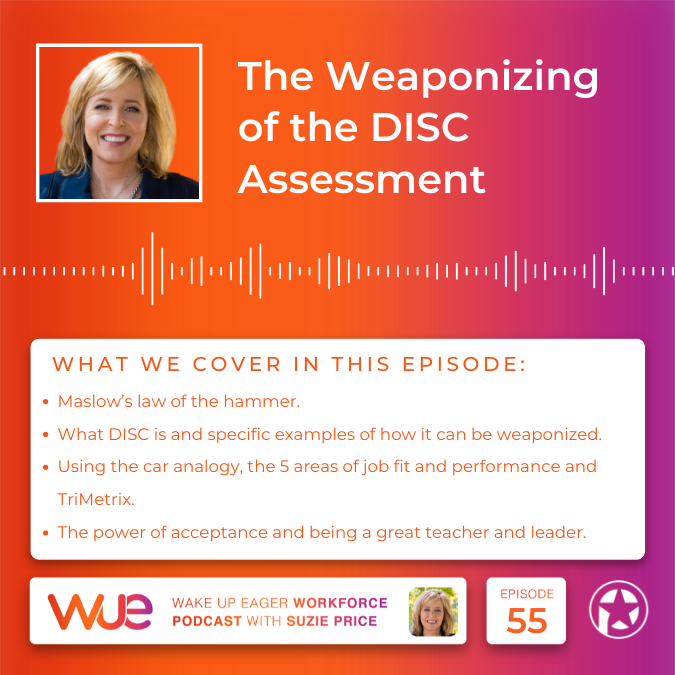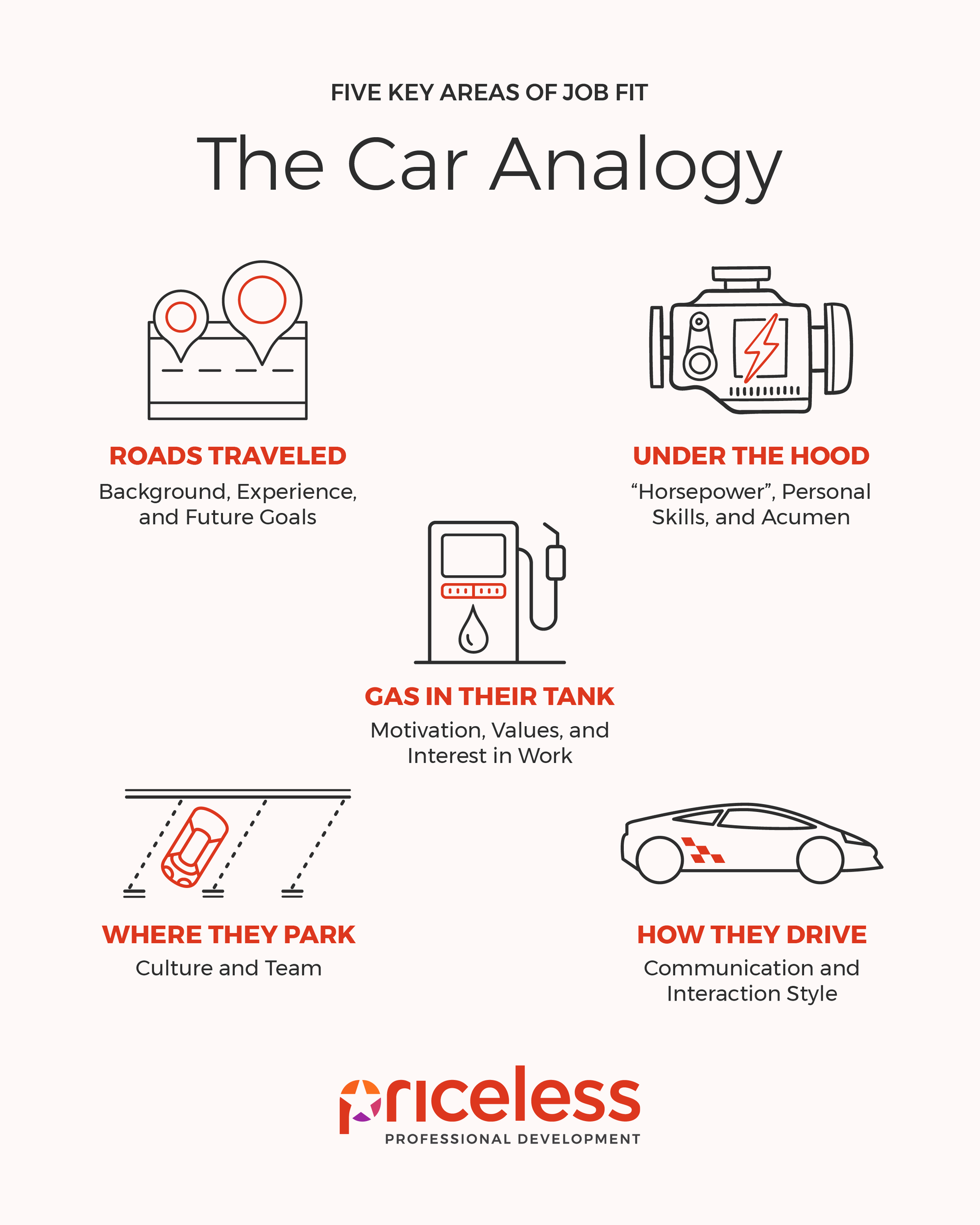The Know How You Need & the Tools to Get You There... Get Certified >

Podcast Episode #55:
The Weaponizing of the DISC Assessment

Overview of Episode #55 ---
- Maslow’s law of the hammer, a cognitive bias that involves an over-reliance on a familiar tool.
- What DISC is and specific examples of how it can be weaponized.
- Using the car analogy, the 5 areas of job fit and performance and TriMetrix.
- The power of acceptance and being a great teacher and leader.
Timing on Recording: @ 3:20 ---
Topic 1: What is the DISC Assessment?
- Popular online assessment tool used all over the world. (Over 40 million people have taken it!)
- Based on four Communication Styles that match the letters: D, I, S, C. Each Communication Style represents different observable behavioral and communication tendency.
- Overview of the styles (Most people are a mix of styles):
- D – Dominance
- I – Influence
- S – Steadiness
- C – Compliance
- Highlights of the DISC Assessment: Your DISC Communication Style Strengths; Blind Spots; “Do's and Don'ts” for Communication; Your Ideal Work Environment; Other’s Perceptions of You; Tips on how you like to be managed; What motivates you; How you come across to others and more!
- A great tool to use with teams to help people understand and appreciate different styles, different interests, so that they can work together more effectively.
- Builds self-awareness and how to value differences.
- Quick and easy to understand.
Timing on Recording: @ 6:37 ---
Topic 2: Examples that Demonstrate the Over Application and Weaponizing of the DISC Assessment.
- Consultant with a new CEO planted concern and worry about each one of the new team members.
- “Dave is not assertive enough to be the Sales Manager.”
- “Karen shouldn't be in charge of Accounting, she's not detail-oriented.”·
- About the Human Resource Manager, “I'm not sure she's people-oriented.”
Timing on Recording: @ 9:32 ---
Topic 3: How to Alleviate the Over Application or Weaponizing of DISC.
- Help clients understand there are other factors of performance, we do that through a car analogy.
- DISC is how you drive; it’s what you see.
- Gas in the tank; what are you motivated by, what makes you want to go, fills your tank?
- Under the hood; Horsepower; Acumen, your personal skills, your level of ability to work well with others or the ability to take responsibility for mistakes, etc.
- Roads traveled; Where you have traveled, experience and future plans, where do you want to go?
- Where you’re parked; What is the culture, what is the team, what is the environment?

DISC (How They Drive) is just ONE view of job fit and performance.
Timing on Recording: @ 12:29 ---
Topic 4: Looking at the Examples that Demonstrate the Over Application and Weaponizing of the DISC Assessment through the Car Analogy.
- Dave: Even though his style is not direct and assertive, his interests are, what puts gas in his tank. And his personal skills, the horsepower, he scored well-developed in all 25 personal skills. His horsepower and what puts gas in his tank is a match with the position. Roads traveled, Dave had been in the industry his entire career. Where you are parked, culture, team, Dave’s team respected him, were inspired by him and he helped keep the company moving.
- Make sure to look at the Five Areas of Job Fit.
Timing on Recording: @ 20:05 ---
Topic 5: Definition of Weaponizing and More Examples.
- Weaponizing is a broad term with respect to the degree of harm the weapon is meant to cause. It may be designed to cause character assassination, so confusion or otherwise dis- or misinformed people.
- “Those quiet people are too slow and they're not fast and smart like we are, they drive me crazy.”
- “I could never work with her, she's too talkative and too damn enthusiastic. She needs some coaching.”
- “Us high I's and D's have to stick together.”
- “Oh, we're the same or you're different from me, so I couldn't work with you.”
Timing on Recording: @ 25:31 ---
Topic 6: Accuracy of Sciences.
- One Science – 60% accurate.
- Two Sciences – 74% accurate.
- Three Sciences – 94% accurate.
- The Department of Labor says, “Use at least three tools and then use it for less than 30% of your decision.”
Timing on Recording: @ 28:29 ---
Topic 7: Hiring Decision Recommendations.
- The Department of Labor says, “Use at least three tools and then use it for less than 30% of your decision.”
- When working with teams, I recommend that the company use the DISC and motivators, it's called the Talent Insights Assessment, it give you a better result in building trust and having the team better understand each other. DISC and motivators, when using it in a developmental manner or in a team manner, can to help people.
- One-page tool called a Talent Tracker; there are wheels that plot people where their style is located. You know where their teammates are located on the wheel and how they like to communicate. You can start to move out of judgment.
- Go from judgment, to understanding, and then from understanding to appreciation and valuing.
- Build trust.
- Value.
- Acceptance.
Timing on Recording: @ 34:03 ---
Topic 8: Top Takeaways.
- When taking the DISC assessment, look for your strengths and your blind spots, and look for the strengths and values others bring in their style and their behaviors. Use it to build love and acceptance, not to be used as a weapon or judgment, or “I know something about you that you don't know.”
- Couple the DISC assessment with the Five Areas of Job Fit.
A Great Teacher...
A great teacher is a fabulous student.
A great teacher is someone who understands where you are and understands where you want to go and helps you build bridges to get you there.
A great teacher is always looking toward where she knows you want to go, and never looking back at where you’ve been.
A great Teacher never asks you to justify why you are where you are but instead looks optimistically with you where you are going.
A great Teacher loves where she is… but doesn’t demand you be in the same place.
A great Teacher honors where you are and encourages movement from where you are to what you want to be, and leaves where she is and where she wants to be, out of the student’s equation.
---From Abraham-Hicks Publication
PRICELESS RESOURCES
PODCAST: Subscribe to our Podcast or Help Us and Leave a Review
NEWSLETTER: Sign up for Monthly Email Updates
PODCAST: Most Recent Episodes Directory of All Episodes
RELATED DEVELOPMENT SERVICES:
· Certification: Become the Expert: Assessment Certification Training
· Hiring: Hiring: Secret to Superior Performance
· Surveys: 360 Feedback and Organizational Surveys
· Complimentary Consulting Call or Send Us Feedback: Contact Suzie





